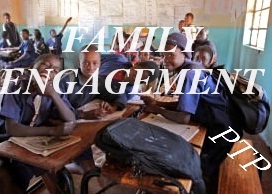Family and community engagement and its impact on the child’s education.

Family engagement is all of the things that families do to support their children’s success, both in relation to school and in relation to society.
I think of family engagement as a public good and as a shared responsibility.
Family engagement is a process of a teacher and a parent, sitting down, and talking with each other about your child, who’s in the teacher’s classroom, with whom with whom he/she is working.
And telling the parent telling the teacher what he needs to know to be the best teacher I can be.
Family engagement is really about building a relationship and a collaborative experience around supporting that child.
It is really how you enjoin families in being part of the solution for their students first, and then their schools second.
Family engagement is about engaging in the life of your child in school, but also in changing our system so that your child and all children have a chance for really a high-quality education.
One can choose to set the boundaries some place between family and the rest of the world, but it all matters.
Parents have agency.
It’s not we’re doing to; it’s we’re doing with.
Engagement is a two-way street.
It means letting families know not only about what’s happening, but what some of the challenges are and relying on them for real solutions.
It’s work where parents, caregivers, and teachers see themselves, in many ways, as equals.
People say, family engagement really doesn’t matter.
What we really are supposed to be focused on is teaching and learning.
What would your response be to someone who came at you that way and said that to you?
Well, I would say that anybody who thinks family engagement is not important is missing an important chance to really accelerate student success.
They’re missing an important chance to have better solutions and better ideas for the work.
And most importantly, they are missing the chance to ensure that whatever work they do is sustainable.
We have a lot of research that shows that when families are involved and engaged, students do better.
We know that.
Again, and again and again, you see that family’s input, family support, and family’s engagement is related to youth’s outcome, both in the elementary school and the secondary school level.
The more we focus on the partnership and the collaboration, the greater and the broader the effects become.
What would you say to the people who say, what parents do make no difference whatsoever?
I’d want to know what planet they live on.
I don’t know why anyone would take seriously the idea that parenting doesn’t matter.
I’d say it’s hard to hold that view if you look at the evidence.
Empowering parents with specific actionable things they can do to support student achievement
leads them to actually do it, and improve student success.
Ways to learn from families:
- Ask families about ways they encourage their children at home and ways to share their cultural traditions.
- Explore ways to enhance what families are already doing.
- Create small, friendly settings during occasions such as class meetings, teacher- parent conferences, grade-level potluck dinners, and family breakfasts that will encourage families to speak.
- Invite families to class to tell their education stories.
- What were the schools they attended like?
- How were their parents involved in their learning?
- What people and experiences helped them to learn?
- At every conference with families, ask about their expectations for their children’s education.
- Make sure their children are enrolled in the program and taking the courses that will prepare them for that future.
- Give families information about how the education system (and local government) works.
- Make field trips to district offices and school board meetings.
Develop families’ efficacy.
Efficacy comes from feeling confident that they can help their children do well in school and be happy and safe.
It also comes from feeling they can overcome negative influences on their children and have a positive impact on the school and neighbourhood.
These activities will promote families’ sense of efficacy:
- Engage families in planning how they would like to be involved at school.
- Consult a representative sample of parents and families, not just the PTO leader- ship, about school policies and proposed actions.
- Involve families in action research. Ask them to develop and conduct surveys of other families. Invite them to observe in the classroom, review books and materials, and visit other schools to gather ideas.
- Make it easy for parents to meet and discuss concerns with the principal, talk to teachers and guidance counsellors, and examine their children’s school records.
- Invite families to attend staff development sessions and faculty meetings.
- Facilitate families’ connections with programs for young people and youth groups.
- Work with families to help them monitor their children’s activities. Create a school directory, so they can contact other parents, especially those of their children’s friends.
- Offer workshops on communicating with their children with topics parents suggest, such as talking with children about drugs, dating, problems with friends or family, and values.
Develop the capacity of school staff to work with families and community members.
- help all staff recognize the advantages of school, family, and community connections.
- explore how trusting and respectful relationships with families and community members are achieved.
- enhance school staff’s ability to work with diverse families.
- enable staff to make connections with community resources.
- explore the benefits of sharing power with families and community members.
Join the Enlightened Knowledge team for more






